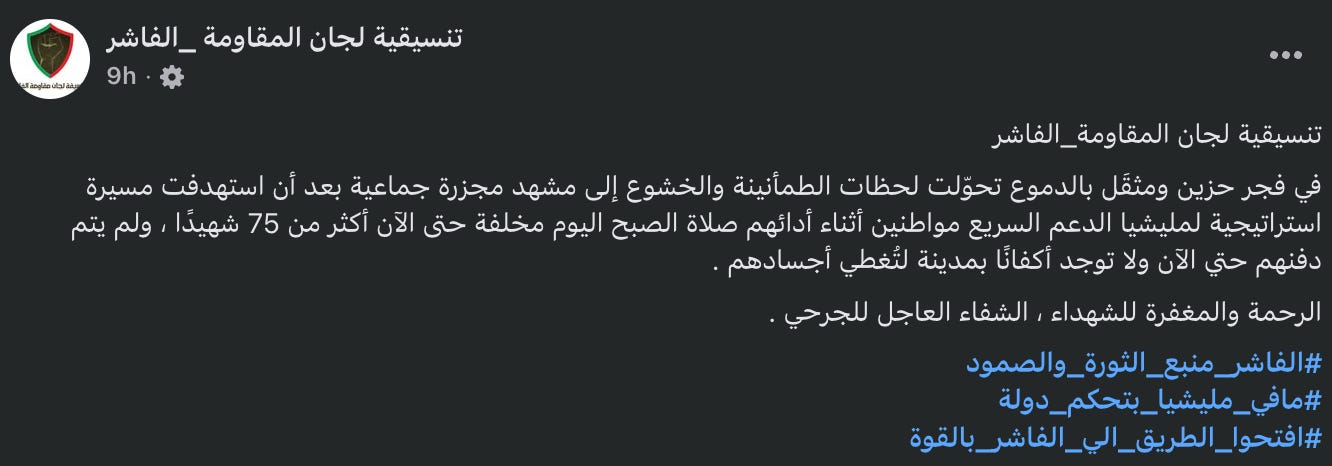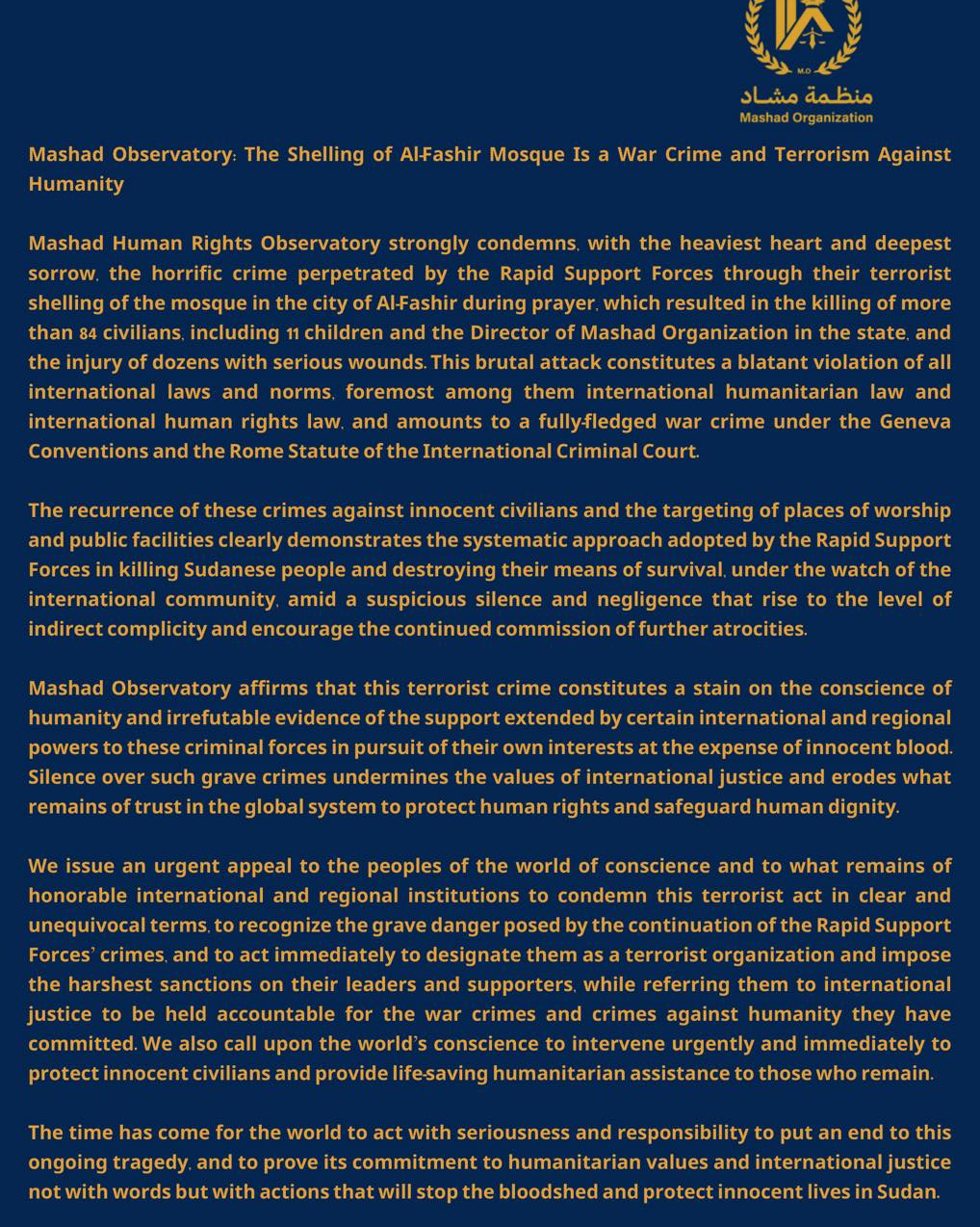Worshippers massacred in RSF drone strike on Mosque in El Fasher
Mass civilian casualties deepen fears of ethnic cleansing in North Darfur
A militia drone strike on Friday morning massacred scores of civilians during dawn prayers in El Fasher, collapsing a mosque onto its congregation and leaving the prayer hall strewn with bodies. Witnesses described worshippers crushed beneath bricks and rubble, with rescue efforts slowed by the devastation.
The strike hit Masjid al-Safiya at around 4:30 a.m. in Safiya, a small neighborhood wedged between Darja Aula and Abu Shouk on the western side of El Fasher, just north of the airport and south of the former UNAMID base targeted by RSF forces the previous day.
Resistance committees and multiple local sources told Sudan War Monitor that more than 75 civilians were killed, with the dead still unburied due to shortages of burial shrouds under the city’s ongoing siege.
A video recorded by members of the El Fasher Resistance Committee and circulated online showed corpses dragged from rubble, blood pooled across the mosque floor, and the collapsed structure reduced to rubble. Sudan War Monitor geolocated the footage to Safiya at 13°37'56.05"N 25°19'34.17"E, confirming the site of the strike.
The attack comes as RSF forces push deeper into El Fasher, fighting block by block against Sudanese Armed Forces (SAF) and allied rebel formations defending the 6th Infantry Division headquarters in the city center — the last functioning army division in all of Darfur. The RSF has seized control over the rest of the region.
On Thursday, heavy clashes engulfed the former UNAMID base northwest of the city, where SAF and allied forces repelled a major RSF assault aimed at cutting through to the division headquarters. Several senior RSF commanders, including the officer in charge of the assault, were reported killed. The mosque bombing appears to have been a retaliatory strike following those losses.
El Fasher has become the last sanctuary for Darfuris displaced from the countryside, its swelling population composed largely of families from African tribes including the Zaghawa. The killings in Safiya have deepened fears that the RSF campaign seeks not just military victory but demographic cleansing — an attempt to crush the city’s resistance by targeting its civilian base.
The massacre at Masjid al-Safiya stands among the bloodiest single incidents of the war in North Darfur, underscoring the RSF’s use of drone warfare against civilian targets and intensifying calls to recognize its actions as war crimes.
In a statement, The Coordination of El Fasher Resistance Committes, putting the death toll at 75, and blaming the paramilitary RSF for the attack and that the bodies of the victims have not yet been burried due to lack of shoruds in the city.
“At a sorrowful, tear-filled dawn, moments of calm and devotion turned into a scene of mass slaughter after a strategic convoy of the Rapid Support Militia struck civilians while they were performing the dawn prayer … leaving more than 75 martyrs. Their bodies have not yet been buried and there are no shrouds in the city to cover their corpses,” the committee said in its first statement reviewed by Sudan War Monitor.
In a separate statement, the committees accused both the central government and Darfur’s former rebel leaders of abandoning El Fasher, warning that the city had been left to face slaughter alone. They demanded immediate intervention from the military authorities in Khartoum to prevent further massacres in the besieged capital of North Darfur.
“The noose has tightened, the siege and death have grown harsher in every corner, while the central authority and Darfur leaders stand on the pavement watching death as a show. All they do are empty press conferences and foreign visits that neither break the siege nor feed the hungry or stop the bleeding. For more than two and a half years El Fasher has been fighting on behalf of everyone — it was left alone when children were choking from hunger, when mothers were being eliminated in shelters and elders were being killed in cold blood. El Fasher has been abandoned to the elements between the hammer of the militias and the anvil of official betrayal.”
“The central authority, mired in illusory calculations and media theatrics, is incapable of taking a decisive stance or even sending a single food truck. The military and political leaders of Darfur’s movements — who were born of suffering — have become part of the authority; their main concern is moving between hotels and capitals, leaving their soldiers, officers and all the people of El Fasher to siege and starvation, as if the cause had ended for them and as if El Fasher were not part of Darfur or Darfur part of the homeland.”
“To the masses of our people: we are fighting today on two clear fronts.”
“The first is against the Al-Dagalo militias, which are attempting with brutality to engulf what remains of Sudan and are trying to subjugate El Fasher by force of arms, terrorism, starvation and ethnic cleansing. They are not fighting a military front; they are targeting civilians — children, women and the elderly — in an effort to extinguish the city’s spirit and crush its will.”
“The second is against the opportunists — the leaders and generals who abandoned the city and left it to its fate when it was their duty to protect it — and against the power-hungry from within the state itself and the opportunists who exploited people’s sacrifices to climb to positions of decision, only to abandon their city in the moment of truth. These people differ from the militias only in that they wear the clothes of “politics” and speak the language of “false peace,” while in essence they are tools for pushing projects of surrender and subservience.”
“We remind everyone that we understand the battle will be long and that the balance is not equal in terms of hardware, but we possess what the enemy does not: faith in our cause, honesty with our people, and full commitment to our principles. The resistance will continue not only against the invading militias but against anyone who tries to extinguish the embers of steadfastness in El Fasher or bargain away the blood of the martyrs.”
Minni Arko Minnawi, governor of Darfur and leader of the Sudan Liberation Movement,
condemned the strike as a war crime in a statement following the attack on El Fasher.
He described the drone bombing of the mosque during prayers as a massacre.
“Today the militia committed a massacre at Safia Mosque in El Fasher during the dawn prayer. The number of martyrs exceeds sixty (60), most notably Mr. Al-Malik Sharif Adam Al-Tahir Nourin, head of the Dar Sweni administration. Mercy and blessing to the martyrs, and we condemn in the strongest terms the continued genocide and the unjustified international silence,” Minnawi wrote on X, (Formerly Twitter).
Minnawi serves as the de facto commander of the Joint Forces, a pro-SAF alliance of former Darfur rebel factions. The coalition has committed thousands of fighters to the defense of El Fasher, but collapsing supply lines, dwindling stocks of ammunition and food, and shrinking manpower have strained its ability — and that of the army — to hold the city against the RSF offensive.
The Mashad Human Rights Observatory also issued a blistering denunciation, calling the mosque bombing “terrorism against humanity.” The group said more than 84 civilians, including 11 children and the head of Mashad’s own local branch, were killed.
“This brutal attack represents a blatant violation of all international laws and norms, foremost among them international humanitarian law and the Geneva Conventions … It constitutes a fully-fledged war crime,” the statement read, accusing regional and international powers of complicity through silence, and called for the RSF to be formally designated a terrorist organization.
El Fasher has long served as a refuge for Darfur residents fleeing fighting in the countryside. Its population today is made up largely of displaced families from Darfur’s African tribes, such as the Zaghawa, Fur and others, who escaped earlier RSF campaigns in rural villages.
The scale of the mosque massacre has heightened fears that the Rapid Support Forces is pursuing a strategy of ethnic cleansing, aimed not only at breaking resistance but at reshaping the demographics of the last major northern Darfur stronghold outside RSF control.
Videos
⚠️ Graphic Content: The following video may be disturbing. Viewer discretion strongly advised.
In this video, filmed by a member of the El Fasher Resistance Committee, bodies of worshippers lie beneath the debris and broken bricks of the collapsed mosque, while residents move carefully among the rubble, trying to recover their dead with their hands.
In this video, geolocated by Sudan War Monitor to the site of the drone strike, volunteers and residents are seen preparing the bodies for burial just outside the mosque in El Fasher.




